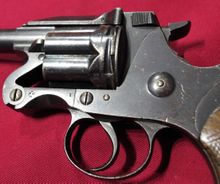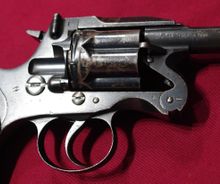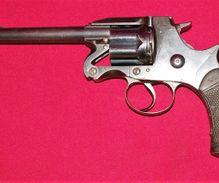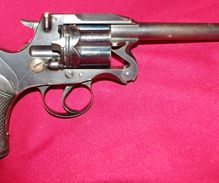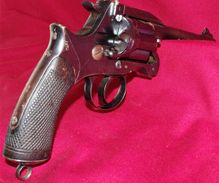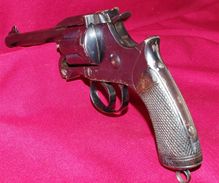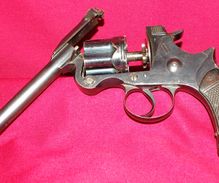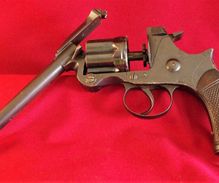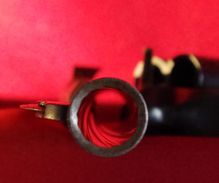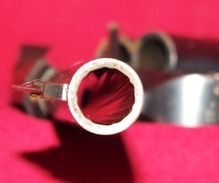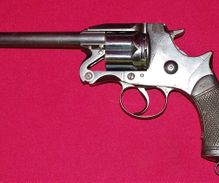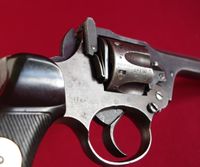Enfields
For Sale / Te Koop / À Vendre
Click on photo to enlarge/Klik op de foto om te vergroten/Cliquez sur la photo pour l'agrandir
Enfield .476 MkI 1880
These are very rare Enfield revolvers designed by Owen Jones, an American from Philadelphia, who was employed at the Royal Small Arms factory at Enfield Lock Middlesex UK. These revolvers use the Owen Jones’ cartridge ejection patent. The Enfield 1880 was designed to replace the .450 Adams revolver and give greater stopping power. It has 7 groove Henry rifling sighted for 50 yards. The lock mechanism was a joint patent of J. Warnant and M. Kaufmann. These were two very important designers of handgun patents during the late 1800’s. Kaufmann made some fantastic revolvers on his own, working with Webley (examples can be seen in the museum).
These revolvers were issued to the Royal Navy in 1880 but an unfortunate accident occurred when a Lieutenant was climbing into a long boat and his revolver fell out of his holster, the hammer struck a piece of wood and fired killing the Officer. The War Office decided that a safety feature was needed to stop the hammer from resting on the cartridge and fitted retrospectively to all revolvers after 1887. A new improved model, the MkII, was introduced in 1882.
Major H.E.C. Kitchener of Egypt and WW1 fame wrote in 1886 “the pull off is good, the weapon appears to me inaccurate and clumsy” These revolvers are like Marmite you either love ‘em or hate ‘em!
The .476 cartridge was not a particularly powerful round, firing a 265 grain hollow base bullet propelled by 18 grains of black powder. The revolvers were replaced by the new series of Webley service revolvers starting with the .455 MkI in 1889. Many of the surplus MkII Enfield revolvers were sent out to Canada and Australia (examples can be seen in the museum). The survival rate of the MkI’s is very low which is why they are so rare in any condition.
Revolver Enfield .476 Mk I (1880)
Ce très rare type de revolvers a été conçu par Owen James, un Américain originaire de Philadelphie, qui était employé à la Royal Small Arms Factory d'Enfield Lock dans le Middlesex au Royaume Uni. Il met en oeuvre son brevet concernant l'éjection des douilles. En 1880, le revolver réglementaire britannique était l'Adams en calibre .450; son pouvoir d'arrêt était jugé insuffisant et le revolver Enfield était destiné à le remplacer. Son canon est muni de 7 rayures Henry adaptées au tir à 50 yards (45 mètres). Le mécanisme est basé sur un brevet conjoint de J. Warnant et de M. Kaufmann, deux célèbres concepteurs d'armes de poing de la fin du 19ème siècle. Kaufmann a notamment fabriqué à titre personnel plusieurs revolvers remarquables alors qu'il travaillait chez Webley (certaines de ses réalisations sont exposées au Musée).
Les revolvers Enfield ont été distribuées à la Royal Navy dès 1880. Un malheureux accident s'est alors produit lorsque l'arme d'un Lieutenant est tombée de son étui alors qu'il était en train de monter dans une chaloupe; le chien a percuté une pièce de bois et le coup est parti, tuant l'Officier. Le War Office (Ministère de la Guerre) a considéré qu'il était indispensable d'installer un système empêchant que le chien soit en contact avec la cartouche. Le modèle amélioré, dénommé Mk II, est apparu en 1882 et les revolvers déjà en service ont été modifiés.
Kitchener, qui s'est illustré au Soudan et lors de la première guerre mondiale, a écrit en 1886 au sujet du revolver Enfield : " La détente est correcte. L'arme me paraît cependant peu précise et disgracieuse. Ces revolvers sont comme la cuisine, on l'adore ou on la déteste".
La cartouche de .476 n'était pas particulièrement puissante, tirant une balle ogivale à base creuse de 265 grains (17,2 grammes) poussée par 18 grains (1,2 grammes) de poudre noire. Les revolvers Enfield .476 Mk I et Mk II ont été remplacés en 1889 par la lignée des revolvers de service Webley dont le premier représentant tirait la cartouche de .455 Mk I. Un certain nombre d'Enfield Mk II ont été cédés au Canada et à l'Australie (on peut en voir au Musée). Peu d'Enfield Mk I sont parvenus jusqu'à notre époque, ce qui fait qu'ils sont très rares et recherchés quel que soit leur état.
Enfield 1880 Mk I
Ref 1047
€3250
INFORMATION | CONDITION 10 = AS NEW / 1 = POOR |
CALIBRE .476 | FINISH 8 |
BARREL LENGTH 6" | REFINISHED YES |
CIRCA 1880 | BORE 9 |
MILITARY MARKS YES | MECHANICS 9 |
MATCHING NUMBERS YES | GRIPS 8 |
RETAILER - NAVAL MARKED | LICENCE NO |
Enfield 1880 Mk I
Ref 1025
SOLD
INFORMATION | CONDITION 10 = AS NEW / 1 = POOR |
CALIBRE .476 | FINISH 8 |
BARREL LENGTH 6" | REFINISHED YES |
CIRCA 1880 | BORE 10 |
MILITARY MARKS YES | MECHANICS 10 |
MATCHING NUMBERS YES | GRIPS 8 |
RETAILER | LICENCE NO |
Enfield No 2 Mk1**
Ref 1002
€250
INFORMATION | CONDITION 10 = AS NEW / 1 = POOR |
CALIBRE .38S&W | FINISH |
BARREL LENGTH 5"(125MM) | REFINISHED YES |
CIRCA WWII | BORE 10 |
MILITARY MARKS YES | MECHANICS 10 |
MATCHING NUMBERS YES | GRIPS 9 |
RETAILER | LICENCE YES |
Enfield No2 Mk1*
Ref 1003
Sold
INFORMATION | CONDITION 10 = AS NEW / 1 = POOR |
CALIBRE .38S&W | FINISH 8 |
BARREL LENGTH 5"(125MM) | REFINISHED NO |
CIRCA 1939 | BORE 10 |
MILITARY MARKS YES | MECHANICS 10 |
MATCHING NUMBERS YES | GRIPS 9 |
RETAILER | LICENCE YES |
Enfield No 2 Mk1**
Ref 1006
sold
INFORMATION | CONDITION 10 = AS NEW / 1 = POOR |
CALIBRE .38 | FINISH |
BARREL LENGTH " | REFINISHED |
CIRCA | BORE |
MILITARY MARKS | MECHANICS |
MATCHING NUMBERS | GRIPS |
RETAILER | LICENCE YES |
Enfield
Ref 1007
€275
INFORMATION | CONDITION 10 = AS NEW / 1 = POOR |
CALIBRE .38S&W | FINISH 8 |
BARREL LENGTH 5"(125MM) | REFINISHED NO |
CIRCA WWII | BORE 9 |
MILITARY MARKS YES | MECHANICS 10 |
MATCHING NUMBERS YES | GRIPS 9 |
RETAILER | LICENCE YES |
